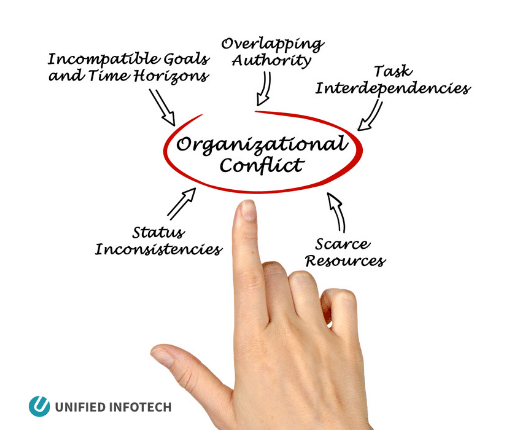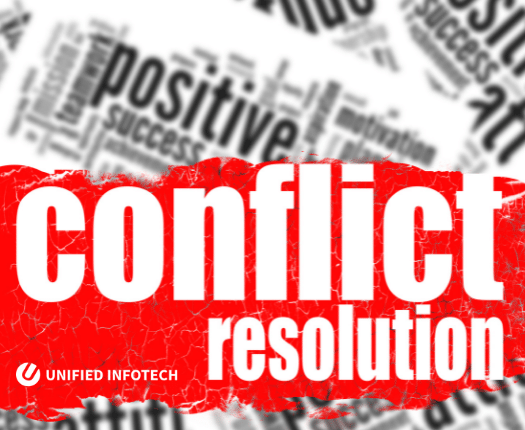Unlock Expert Advice with Zero Commitment.
We’ve Eliminated the Barriers.

Conflict is an unavoidable part of life, primarily when working in a high-powered and sometimes stressful industry like logistics. We cannot always control our exposure to conflict in both our personal and working lives. However, it is possible to use workplace conflict management techniques to produce positive outcomes, dissolve conflicts quickly, encourage teamwork, and transform your business.
In the office or on the road, workplace conflict can create a hostile environment. Not just for the employees involved in the disagreement but for their peers too. It can hinder productivity, collaboration, and healthy communication, leading to additional problems later down the line. As the leader of your logistics business, all eyes will fall to you to provide conflict-resolving guidance to your staff.
Understanding how to skillfully and tactfully manage conflicts in the workplace can minimize their adverse impacts. In some cases, it can even swing hopeless situations to your advantage. Here is everything you need to know about good workplace conflict management in the logistics industry.

Workplace conflict doesn’t always stem from people not getting along. There are many situations and logistical issues that can create animosity between individuals and teams. They include:
There are a myriad of external factors that can lead to workplace conflict. Economic pressure caused by foreign and domestic competition, recession, changing markets, and the impacts of free trade between nations can all exert pressure on individuals and teams. Conflicts could also develop with suppliers and clients because of these factors, impacting customer service and the timely delivery of goods and services.
Due to political pressure and demands from special interest groups and major retailers and customers, logistics businesses can also face rapid regulatory risks. Furthermore, natural disasters and unexpected global phenomena like the Covid-19 pandemic can cause widespread, lasting disruption to supply chains. They force logistics teams to rapidly adjust their strategies to stay afloat in an increasingly competitive market.

The only proper way to deal with workplace conflict and promote positive resolution is to implement intelligent workplace conflict management strategies.
Here are some proven strategies that will assist you.
You can use conflict management practices to develop your conflict awareness skills and pass those skills along to your team. Having these skills will enable you to identify conflicts in the workplace and gain as much clarity as you can about the situation at hand before you act.
Start developing conflict awareness by following these key steps when a conflict becomes apparent:
Your workplace environment needs to be as neutral as possible to facilitate healthy conflict resolution. Let’s elaborate using examples of conflict in the workplace scenarios. Say two of your employees, Steven and Lana, are experiencing a disagreement over what Lana perceives to be rude and inconsiderate treatment by Steven.
If the rest of your team actively takes sides in the argument, they could fuel further conflict and hinder Steven and Lana’s ability to find a resolution for the issue. Encouraging a neutral environment lets all of these parties know that you want to find a solution or agreement and move on as soon as possible.
There are many ways you can gain valuable conflict resolution skills and develop your workplace conflict management strategy as a result. A few essential tips to remember include:
Taking an accusatory tone rarely resolves conflicts in the workplace and can make it worse. Be sure to focus on specific problematic behaviors rather than making comments about people’s personalities.
It’s crucial to be extremely clear about the outcome you want to achieve and be honest with everyone about how you think you could resolve the issue.
Team building exercises give your employees the tools they need to work harmoniously as a team. They boost morale and productivity and can also reinforce your position as a thoughtful and capable leader.
These exercises can range from a quick game to a meeting, conference, or even a retreat that fosters teamwork skills and assists your staff in learning about each other’s work and communication styles. Include your HR and management teams to provide them with a fun learning experience.
Workplace conflict management is a skill that can be fostered and enhanced through regular practice and thoughtful communication.
Effectively managing workplace conflict will enhance your team’s relationships, improve their ability to communicate clearly with each other, and build trust throughout your logistics business.
We’ve Eliminated the Barriers.
We stand by our work, and you will too.